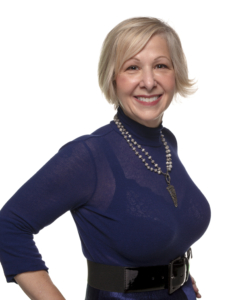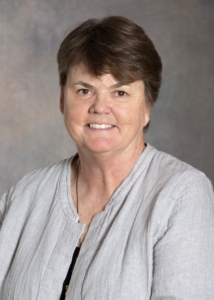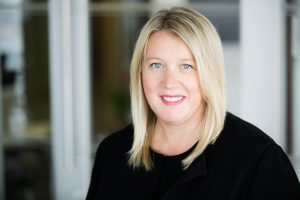 “‘We will be known forever by the tracks we leave,’” quotes Linda Descano, from the Native American proverb she lives by. “To me, that means we need to tread lightly because words and actions have profound consequences.”
“‘We will be known forever by the tracks we leave,’” quotes Linda Descano, from the Native American proverb she lives by. “To me, that means we need to tread lightly because words and actions have profound consequences.”
“But it also means that through our tracks, we can leave a footprint behind to follow,” she remarks, “so other people not only avoid our pitfalls, but also accelerate because they build on our lessons and experiences.”
In this interview, Descano shares some footprints to follow.
Allow Intrigue To Guide You
“My career path has been anything but linear,” says Linda Descano, based again in Philadelphia after thirty years away. Instead she has let intrigue and excitement guide her.
“For me, it’s been about finding opportunities to learn…and finding interesting problems to solve with smart people who want to somehow improve the world or make a difference,” she reflects.
Following that spark of intrigue began in university, when she took a geology class to fulfill her science elective for her English Communications degree, then switched her major.
After pursuing graduate studies in earthquake prediction, she pivoted to work on ways to make K-12 STEM education more hands-on, and then joined a team that was developing a ‘brain’ to drive autonomous underwater vehicles.
Descano then joined an environmental consulting practice which led her to eventually become a member of the environmental affairs team at Citi predecessor Salomon Inc. in 1994. She leveraged her understanding of environmental and social issues to join a socially responsible investment program at Citi, which was one of the first—if not the first—on Wall Street.
Descano then leapt to help launch Women & Co. in 2003 within Citi, an award-winning online financial lifestyle resource for women, eventually serving as President and Chief Executive Officer.
In 2012, she became Managing Director and Global Head of Content and Social at Citi. In 2015, Descano pivoted yet again and went from the brand side to the agency side, joining Red Havas as Executive Vice President in 2015.
“My entire career has been questioning, listening and hearing about challenges—friction in the system, opportunities to grow, trends reshaping customer preferences and needs—and being willing to raise my hand and get involved,” says Descano. “I’m always looking to find a way to learn and grow myself.”
Define Your Own Parameters
Early in her journey, Descano experienced professors and colleagues who judged her potential as less than she knew herself capable of—whether due to her Italian heritage, her Catholic upbringing, her weight, her gender, not having a finance degree or not having an MBA.
Time and again, she resisted having others box her in, cultivating inner resilience while growing in self-awareness and managing her own triggers and sensitivities.
“It taught me that people will always see you with perceptions and judgments,” she notes. “And it’s up to each of us to decide—will we let others define the sandbox in which we operate, or will we blow it apart and carve our own path?”
She recalls saying to one such colleague, “I might not have an MBA from Harvard, but I do have an MBA from the ‘School of Hard Knocks.’ So between my brute experience and your Ivy League education, we should together be able to create a stellar program.”
“You have to decide who is going to own and set the parameters for your career and make your choices—don’t put them on autopilot,” she advises. “You have to be the navigator of your career. I set out to become a Managing Director, and that’s exactly what I did.”
Be Intrapreneurial In Your Leadership
“Execution is a passion of mine,” says Descano. “I’m always very focused on ‘I understand the strategy, but how do you execute flawlessly and what’s the right organizational structure?’”
No matter what organization she is a part of, Descano assumes the mindset of the “intrapreneurial executive.”
“When you think of an entrepreneur, you think of people with a lot of flexibility and they’re adaptive. They act as owners. They take initiative. They lean in,” says Descano.
“So as I think of being an ‘intrapreneurial executive,’ I bring that same sense of acting like an owner to the organization I work for. I’m going to be constantly thinking about ways of improving the business,” says Descano. “I act like I own it, as if it’s my investment. It’s working with that same sense of responsibility and drive to make it grow.”
Descano has valued the leaders—both at Citi and Red Havas—that gave her the green lights to create and test and do things differently in order to bring more value to the consumer and community.
“If you just put your head down, you will lift your head up one day and the world around you will have changed and you have not, so how could you be adding value?” says Descano. “It’s so important to deliver, but I believe you have to keep looking around, looking up, looking down, looking sideways— because the world is changing. You have to evolve and grow and adapt.”
Value the Value of Your Network
With incredible female role models in her family, Descano also internalized the importance of helping others and paying it forward.
Outside of her ‘day job,’ Linda has served on the board of numerous organizations dedicated to advancing women and girls, including Step Up, Girl Scouts of the U.S.A., and New York Women in Communications (NYWICI). A past president of NYWICI, she remains an active board member and currently serves as the Treasurer.
“I’ve made it a point throughout my career to spend part of my personal time and money investing in paying it forward with women and girls, mentoring both informally and formally.” says Descano. “Sharing your fortune and facilitating opportunities, that’s how you help people move forward.”
Descano considers running Women & Co.— a business focused on supporting women to be their personal best— for over a decade to be the highlight of her career.
In today’s knowledge economy, Descano also advises that the network you build by supporting others is your greatest asset.
“When I’m faced with a challenge and issue, I have a tremendous network of people I can call on to get the benefit of their experience, insights and knowledge,” says Descano. “Part of the power and value that I bring to an organization’s table is my network and relationships.”
Whether it’s getting a 101 on a new industry for a new business opportunity, connecting a client to several women she trusts in a new field they are entering, or recruiting a speaker, her network has been absolutely invaluable to her.
When you are there for your network, you also create a net for yourself.
“When you show kindness, when you’re willing to help others, even if just to listen to them,” notes Descano, “then the days you fall, the days you aren’t the best you could be, the days you get displaced by circumstance, you have all these people that are softening your fall and supporting you, almost like a spring back up.”
Remember We Are All Human
Much of Descano’s work today is designing transformational communications for organizations during times of change—which has never been more salient than now.
One of the big focuses at Red Havas that animates her is person to person (P2P) communications, or bringing the humanity and empathy back to the forefront of communications.
Remembering that we are all human—no matter if you’re talking to employees, customers or a business—is one topic featured in the monthly podcast she has launched as part of a team, Red Sky Fuel for Thought, providing insight into the communications landscape.
When she’s not being an intrapreneur or supporting other women, Descano can be found reading, or listening to True Crime podcasts in her kitchen while making a couple dozen stromboli for her family.
By Aimee Hansen


